Organizational Environments and Corporate Governance Effects on Accounting Reporting, System and Functioning As Well As Quality
VerifiedAdded on 2023/06/15
|14
|3041
|411
AI Summary
This professional project explores the effects of corporate governance and organizational environments on the accounting system and its quality and functioning. It includes a literature review, research aims and questions, conceptual framework, project execution plan, and proposed project schedule.
Contribute Materials
Your contribution can guide someone’s learning journey. Share your
documents today.
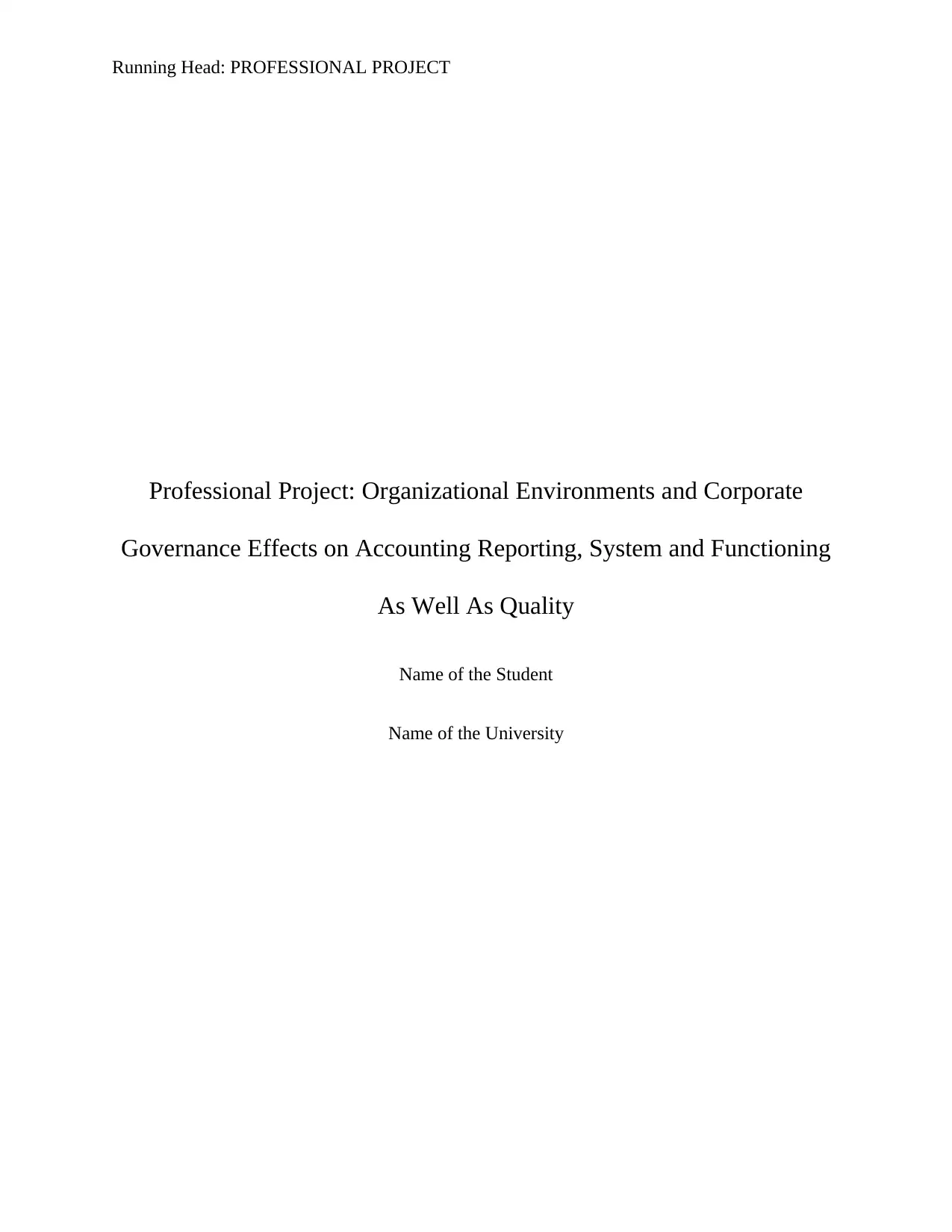
Running Head: PROFESSIONAL PROJECT
Professional Project: Organizational Environments and Corporate
Governance Effects on Accounting Reporting, System and Functioning
As Well As Quality
Name of the Student
Name of the University
Professional Project: Organizational Environments and Corporate
Governance Effects on Accounting Reporting, System and Functioning
As Well As Quality
Name of the Student
Name of the University
Secure Best Marks with AI Grader
Need help grading? Try our AI Grader for instant feedback on your assignments.
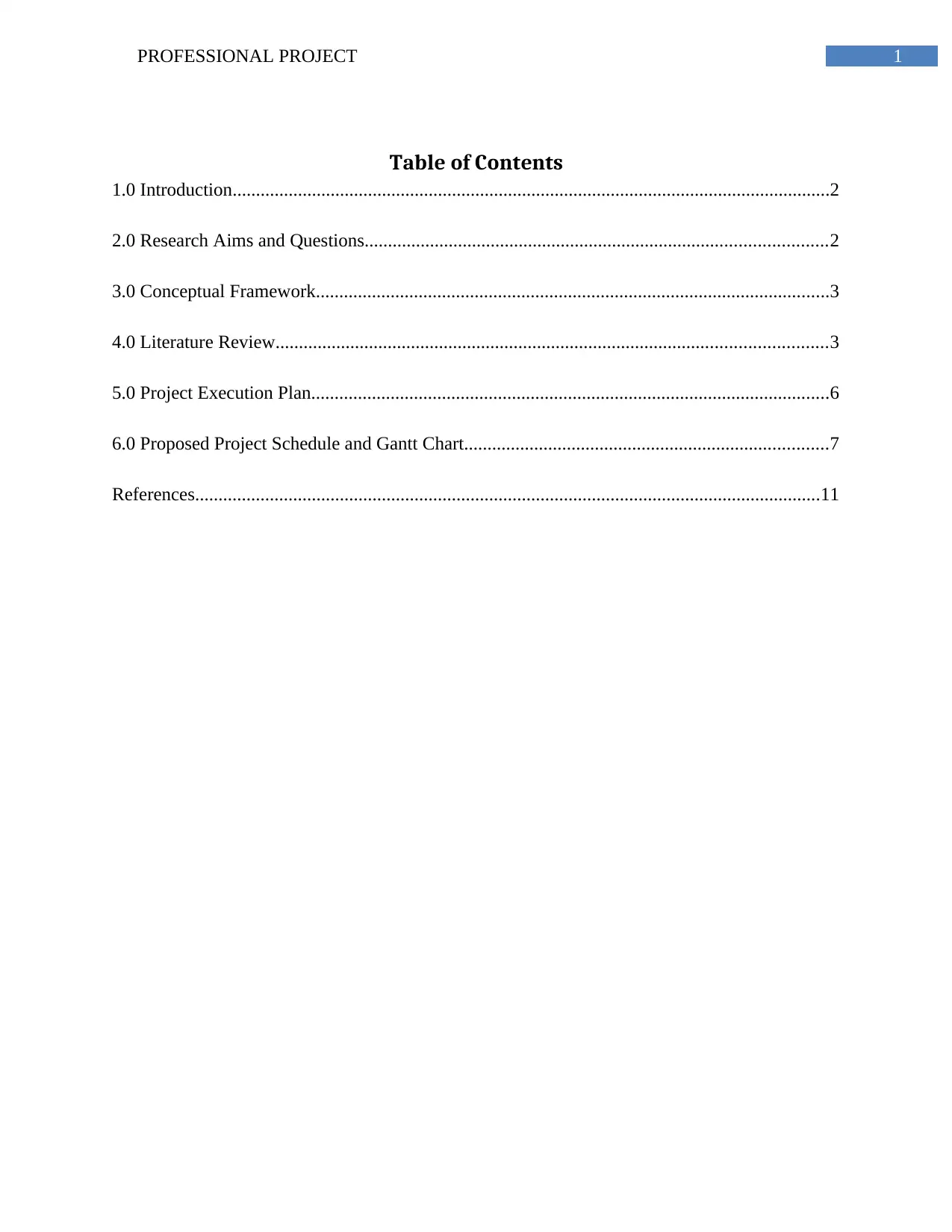
1PROFESSIONAL PROJECT
Table of Contents
1.0 Introduction................................................................................................................................2
2.0 Research Aims and Questions...................................................................................................2
3.0 Conceptual Framework..............................................................................................................3
4.0 Literature Review......................................................................................................................3
5.0 Project Execution Plan...............................................................................................................6
6.0 Proposed Project Schedule and Gantt Chart..............................................................................7
References......................................................................................................................................11
Table of Contents
1.0 Introduction................................................................................................................................2
2.0 Research Aims and Questions...................................................................................................2
3.0 Conceptual Framework..............................................................................................................3
4.0 Literature Review......................................................................................................................3
5.0 Project Execution Plan...............................................................................................................6
6.0 Proposed Project Schedule and Gantt Chart..............................................................................7
References......................................................................................................................................11
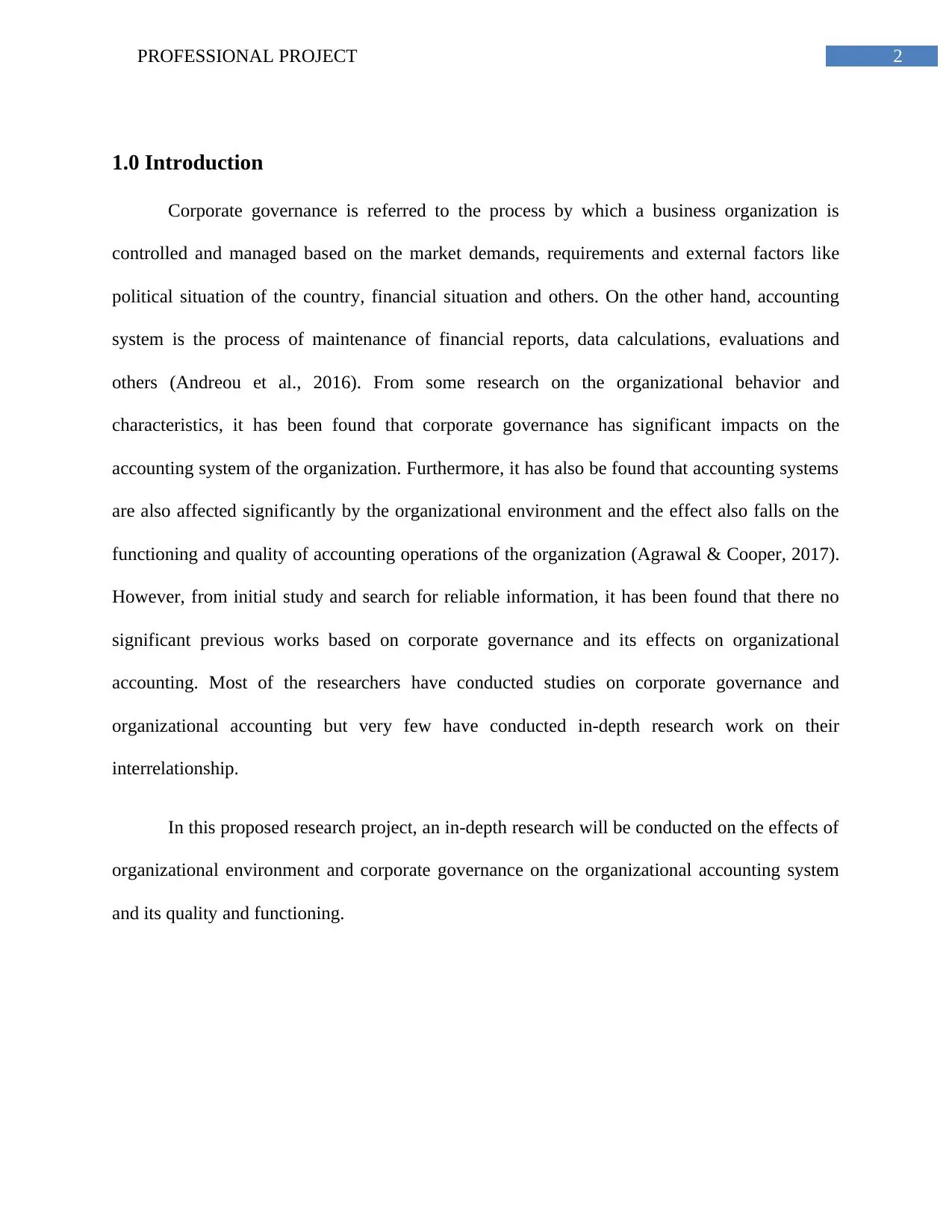
2PROFESSIONAL PROJECT
1.0 Introduction
Corporate governance is referred to the process by which a business organization is
controlled and managed based on the market demands, requirements and external factors like
political situation of the country, financial situation and others. On the other hand, accounting
system is the process of maintenance of financial reports, data calculations, evaluations and
others (Andreou et al., 2016). From some research on the organizational behavior and
characteristics, it has been found that corporate governance has significant impacts on the
accounting system of the organization. Furthermore, it has also be found that accounting systems
are also affected significantly by the organizational environment and the effect also falls on the
functioning and quality of accounting operations of the organization (Agrawal & Cooper, 2017).
However, from initial study and search for reliable information, it has been found that there no
significant previous works based on corporate governance and its effects on organizational
accounting. Most of the researchers have conducted studies on corporate governance and
organizational accounting but very few have conducted in-depth research work on their
interrelationship.
In this proposed research project, an in-depth research will be conducted on the effects of
organizational environment and corporate governance on the organizational accounting system
and its quality and functioning.
1.0 Introduction
Corporate governance is referred to the process by which a business organization is
controlled and managed based on the market demands, requirements and external factors like
political situation of the country, financial situation and others. On the other hand, accounting
system is the process of maintenance of financial reports, data calculations, evaluations and
others (Andreou et al., 2016). From some research on the organizational behavior and
characteristics, it has been found that corporate governance has significant impacts on the
accounting system of the organization. Furthermore, it has also be found that accounting systems
are also affected significantly by the organizational environment and the effect also falls on the
functioning and quality of accounting operations of the organization (Agrawal & Cooper, 2017).
However, from initial study and search for reliable information, it has been found that there no
significant previous works based on corporate governance and its effects on organizational
accounting. Most of the researchers have conducted studies on corporate governance and
organizational accounting but very few have conducted in-depth research work on their
interrelationship.
In this proposed research project, an in-depth research will be conducted on the effects of
organizational environment and corporate governance on the organizational accounting system
and its quality and functioning.
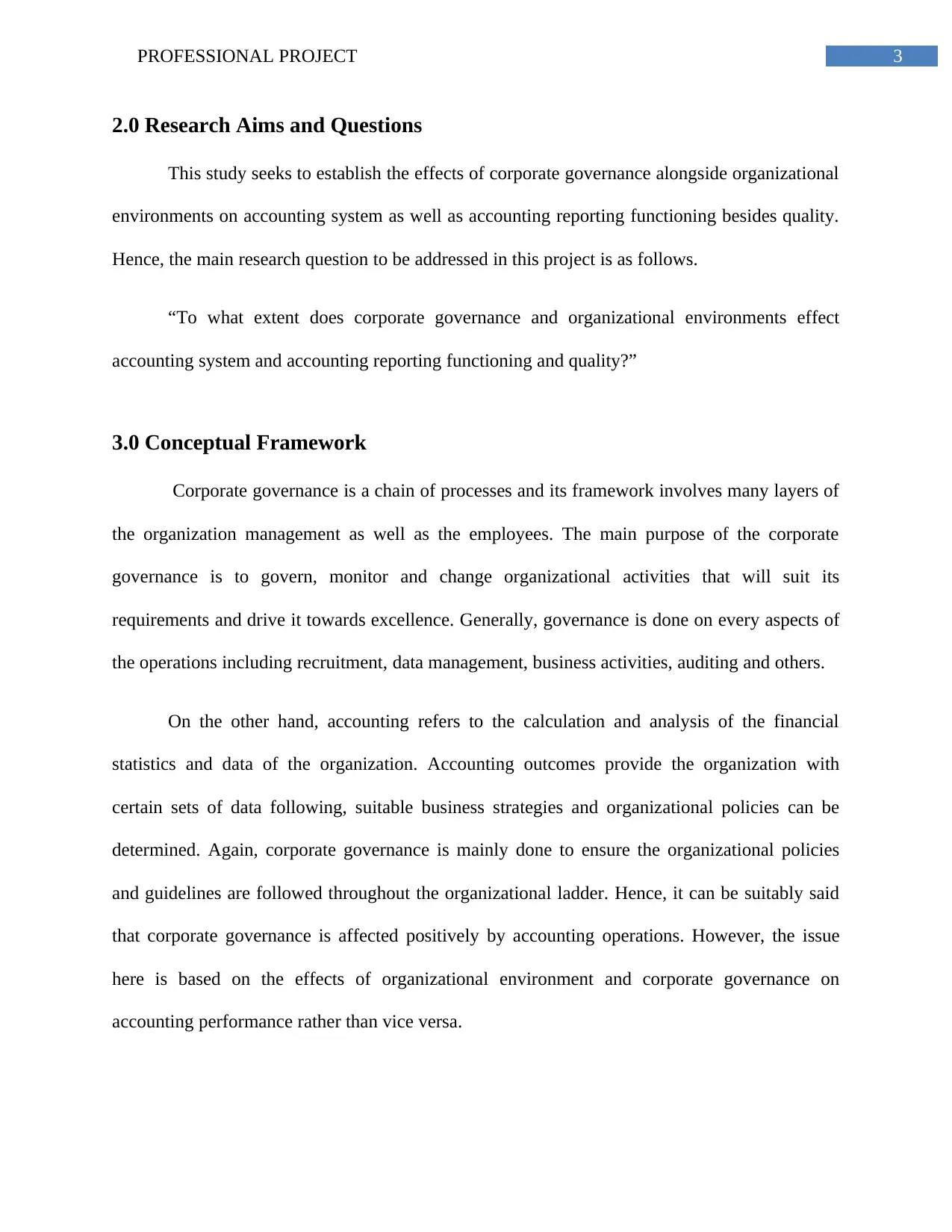
3PROFESSIONAL PROJECT
2.0 Research Aims and Questions
This study seeks to establish the effects of corporate governance alongside organizational
environments on accounting system as well as accounting reporting functioning besides quality.
Hence, the main research question to be addressed in this project is as follows.
“To what extent does corporate governance and organizational environments effect
accounting system and accounting reporting functioning and quality?”
3.0 Conceptual Framework
Corporate governance is a chain of processes and its framework involves many layers of
the organization management as well as the employees. The main purpose of the corporate
governance is to govern, monitor and change organizational activities that will suit its
requirements and drive it towards excellence. Generally, governance is done on every aspects of
the operations including recruitment, data management, business activities, auditing and others.
On the other hand, accounting refers to the calculation and analysis of the financial
statistics and data of the organization. Accounting outcomes provide the organization with
certain sets of data following, suitable business strategies and organizational policies can be
determined. Again, corporate governance is mainly done to ensure the organizational policies
and guidelines are followed throughout the organizational ladder. Hence, it can be suitably said
that corporate governance is affected positively by accounting operations. However, the issue
here is based on the effects of organizational environment and corporate governance on
accounting performance rather than vice versa.
2.0 Research Aims and Questions
This study seeks to establish the effects of corporate governance alongside organizational
environments on accounting system as well as accounting reporting functioning besides quality.
Hence, the main research question to be addressed in this project is as follows.
“To what extent does corporate governance and organizational environments effect
accounting system and accounting reporting functioning and quality?”
3.0 Conceptual Framework
Corporate governance is a chain of processes and its framework involves many layers of
the organization management as well as the employees. The main purpose of the corporate
governance is to govern, monitor and change organizational activities that will suit its
requirements and drive it towards excellence. Generally, governance is done on every aspects of
the operations including recruitment, data management, business activities, auditing and others.
On the other hand, accounting refers to the calculation and analysis of the financial
statistics and data of the organization. Accounting outcomes provide the organization with
certain sets of data following, suitable business strategies and organizational policies can be
determined. Again, corporate governance is mainly done to ensure the organizational policies
and guidelines are followed throughout the organizational ladder. Hence, it can be suitably said
that corporate governance is affected positively by accounting operations. However, the issue
here is based on the effects of organizational environment and corporate governance on
accounting performance rather than vice versa.
Secure Best Marks with AI Grader
Need help grading? Try our AI Grader for instant feedback on your assignments.
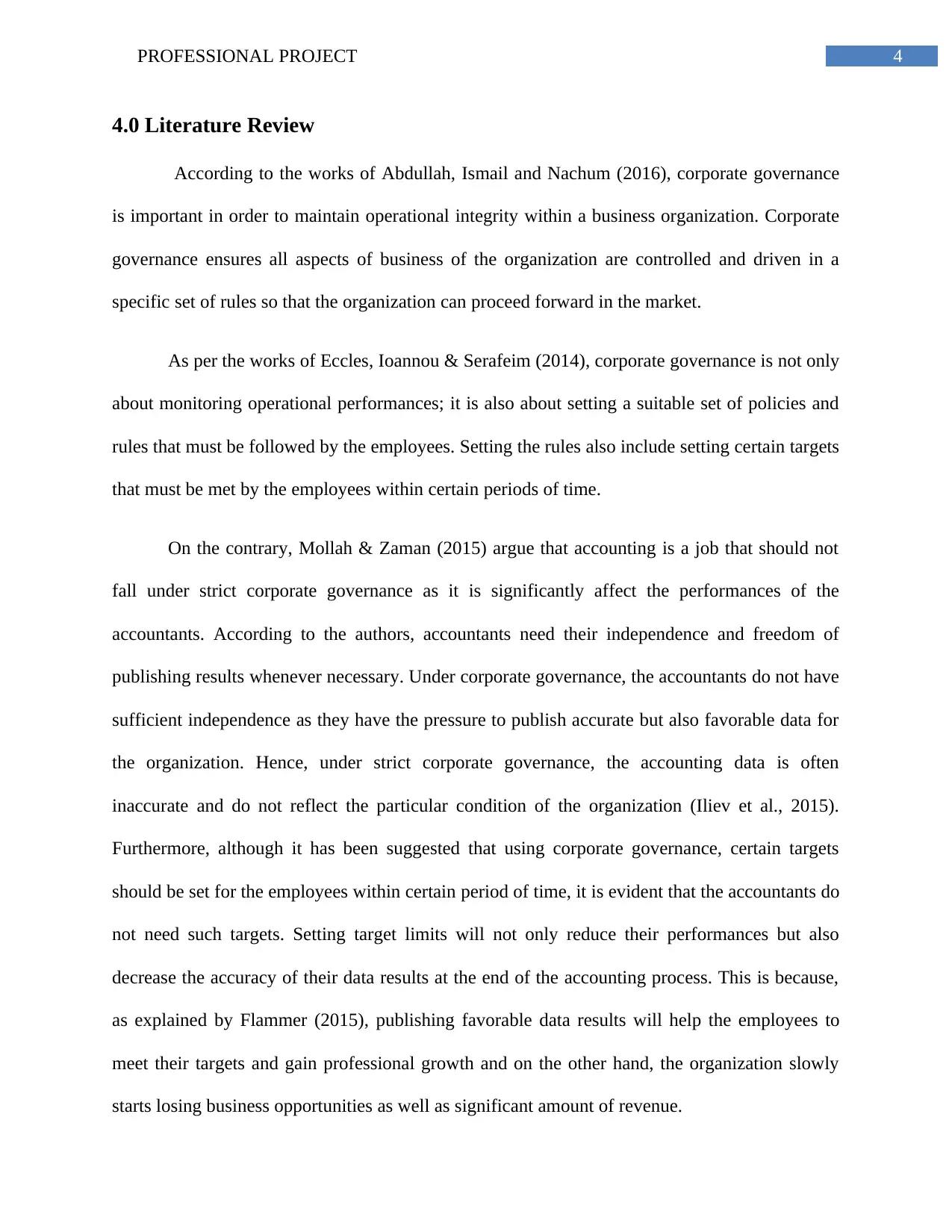
4PROFESSIONAL PROJECT
4.0 Literature Review
According to the works of Abdullah, Ismail and Nachum (2016), corporate governance
is important in order to maintain operational integrity within a business organization. Corporate
governance ensures all aspects of business of the organization are controlled and driven in a
specific set of rules so that the organization can proceed forward in the market.
As per the works of Eccles, Ioannou & Serafeim (2014), corporate governance is not only
about monitoring operational performances; it is also about setting a suitable set of policies and
rules that must be followed by the employees. Setting the rules also include setting certain targets
that must be met by the employees within certain periods of time.
On the contrary, Mollah & Zaman (2015) argue that accounting is a job that should not
fall under strict corporate governance as it is significantly affect the performances of the
accountants. According to the authors, accountants need their independence and freedom of
publishing results whenever necessary. Under corporate governance, the accountants do not have
sufficient independence as they have the pressure to publish accurate but also favorable data for
the organization. Hence, under strict corporate governance, the accounting data is often
inaccurate and do not reflect the particular condition of the organization (Iliev et al., 2015).
Furthermore, although it has been suggested that using corporate governance, certain targets
should be set for the employees within certain period of time, it is evident that the accountants do
not need such targets. Setting target limits will not only reduce their performances but also
decrease the accuracy of their data results at the end of the accounting process. This is because,
as explained by Flammer (2015), publishing favorable data results will help the employees to
meet their targets and gain professional growth and on the other hand, the organization slowly
starts losing business opportunities as well as significant amount of revenue.
4.0 Literature Review
According to the works of Abdullah, Ismail and Nachum (2016), corporate governance
is important in order to maintain operational integrity within a business organization. Corporate
governance ensures all aspects of business of the organization are controlled and driven in a
specific set of rules so that the organization can proceed forward in the market.
As per the works of Eccles, Ioannou & Serafeim (2014), corporate governance is not only
about monitoring operational performances; it is also about setting a suitable set of policies and
rules that must be followed by the employees. Setting the rules also include setting certain targets
that must be met by the employees within certain periods of time.
On the contrary, Mollah & Zaman (2015) argue that accounting is a job that should not
fall under strict corporate governance as it is significantly affect the performances of the
accountants. According to the authors, accountants need their independence and freedom of
publishing results whenever necessary. Under corporate governance, the accountants do not have
sufficient independence as they have the pressure to publish accurate but also favorable data for
the organization. Hence, under strict corporate governance, the accounting data is often
inaccurate and do not reflect the particular condition of the organization (Iliev et al., 2015).
Furthermore, although it has been suggested that using corporate governance, certain targets
should be set for the employees within certain period of time, it is evident that the accountants do
not need such targets. Setting target limits will not only reduce their performances but also
decrease the accuracy of their data results at the end of the accounting process. This is because,
as explained by Flammer (2015), publishing favorable data results will help the employees to
meet their targets and gain professional growth and on the other hand, the organization slowly
starts losing business opportunities as well as significant amount of revenue.
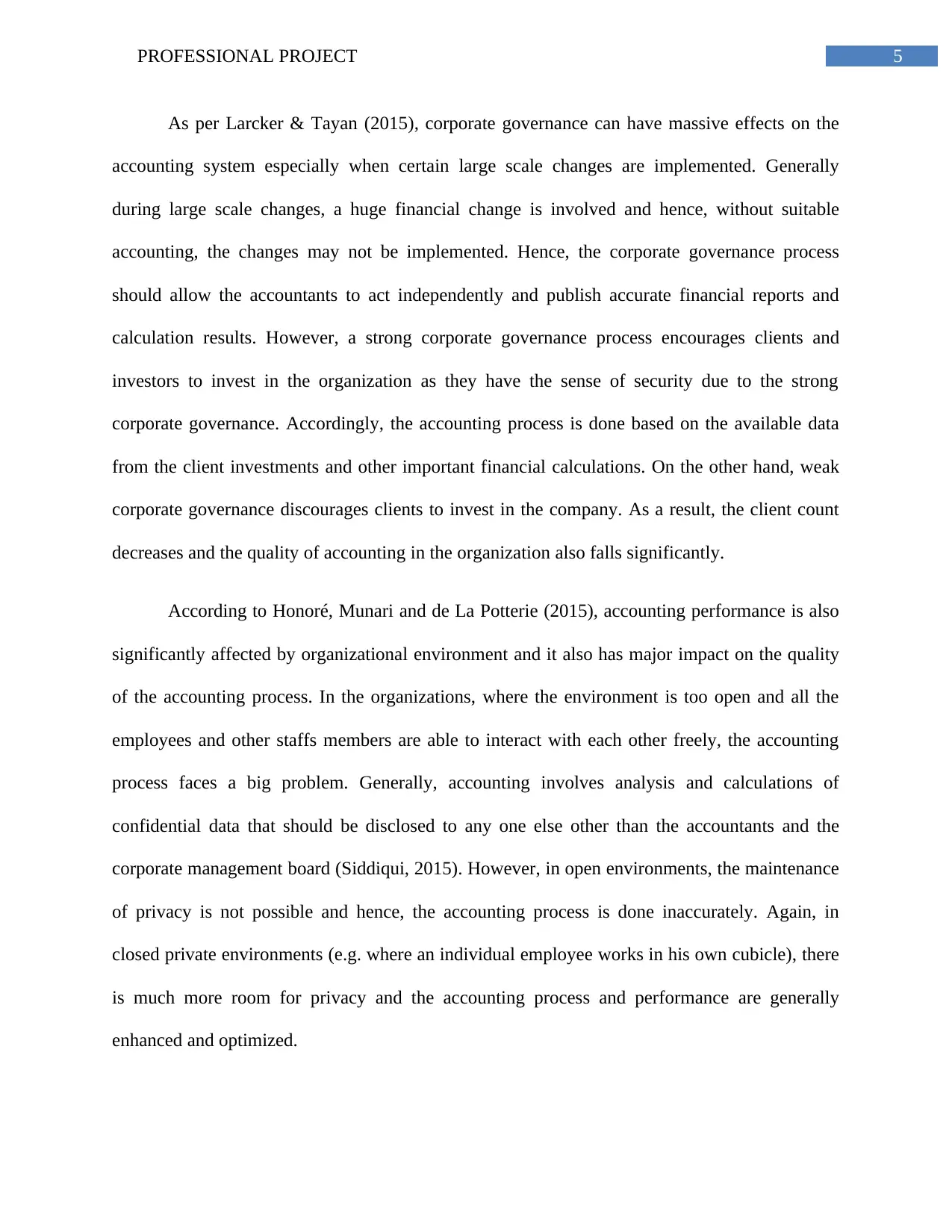
5PROFESSIONAL PROJECT
As per Larcker & Tayan (2015), corporate governance can have massive effects on the
accounting system especially when certain large scale changes are implemented. Generally
during large scale changes, a huge financial change is involved and hence, without suitable
accounting, the changes may not be implemented. Hence, the corporate governance process
should allow the accountants to act independently and publish accurate financial reports and
calculation results. However, a strong corporate governance process encourages clients and
investors to invest in the organization as they have the sense of security due to the strong
corporate governance. Accordingly, the accounting process is done based on the available data
from the client investments and other important financial calculations. On the other hand, weak
corporate governance discourages clients to invest in the company. As a result, the client count
decreases and the quality of accounting in the organization also falls significantly.
According to Honoré, Munari and de La Potterie (2015), accounting performance is also
significantly affected by organizational environment and it also has major impact on the quality
of the accounting process. In the organizations, where the environment is too open and all the
employees and other staffs members are able to interact with each other freely, the accounting
process faces a big problem. Generally, accounting involves analysis and calculations of
confidential data that should be disclosed to any one else other than the accountants and the
corporate management board (Siddiqui, 2015). However, in open environments, the maintenance
of privacy is not possible and hence, the accounting process is done inaccurately. Again, in
closed private environments (e.g. where an individual employee works in his own cubicle), there
is much more room for privacy and the accounting process and performance are generally
enhanced and optimized.
As per Larcker & Tayan (2015), corporate governance can have massive effects on the
accounting system especially when certain large scale changes are implemented. Generally
during large scale changes, a huge financial change is involved and hence, without suitable
accounting, the changes may not be implemented. Hence, the corporate governance process
should allow the accountants to act independently and publish accurate financial reports and
calculation results. However, a strong corporate governance process encourages clients and
investors to invest in the organization as they have the sense of security due to the strong
corporate governance. Accordingly, the accounting process is done based on the available data
from the client investments and other important financial calculations. On the other hand, weak
corporate governance discourages clients to invest in the company. As a result, the client count
decreases and the quality of accounting in the organization also falls significantly.
According to Honoré, Munari and de La Potterie (2015), accounting performance is also
significantly affected by organizational environment and it also has major impact on the quality
of the accounting process. In the organizations, where the environment is too open and all the
employees and other staffs members are able to interact with each other freely, the accounting
process faces a big problem. Generally, accounting involves analysis and calculations of
confidential data that should be disclosed to any one else other than the accountants and the
corporate management board (Siddiqui, 2015). However, in open environments, the maintenance
of privacy is not possible and hence, the accounting process is done inaccurately. Again, in
closed private environments (e.g. where an individual employee works in his own cubicle), there
is much more room for privacy and the accounting process and performance are generally
enhanced and optimized.
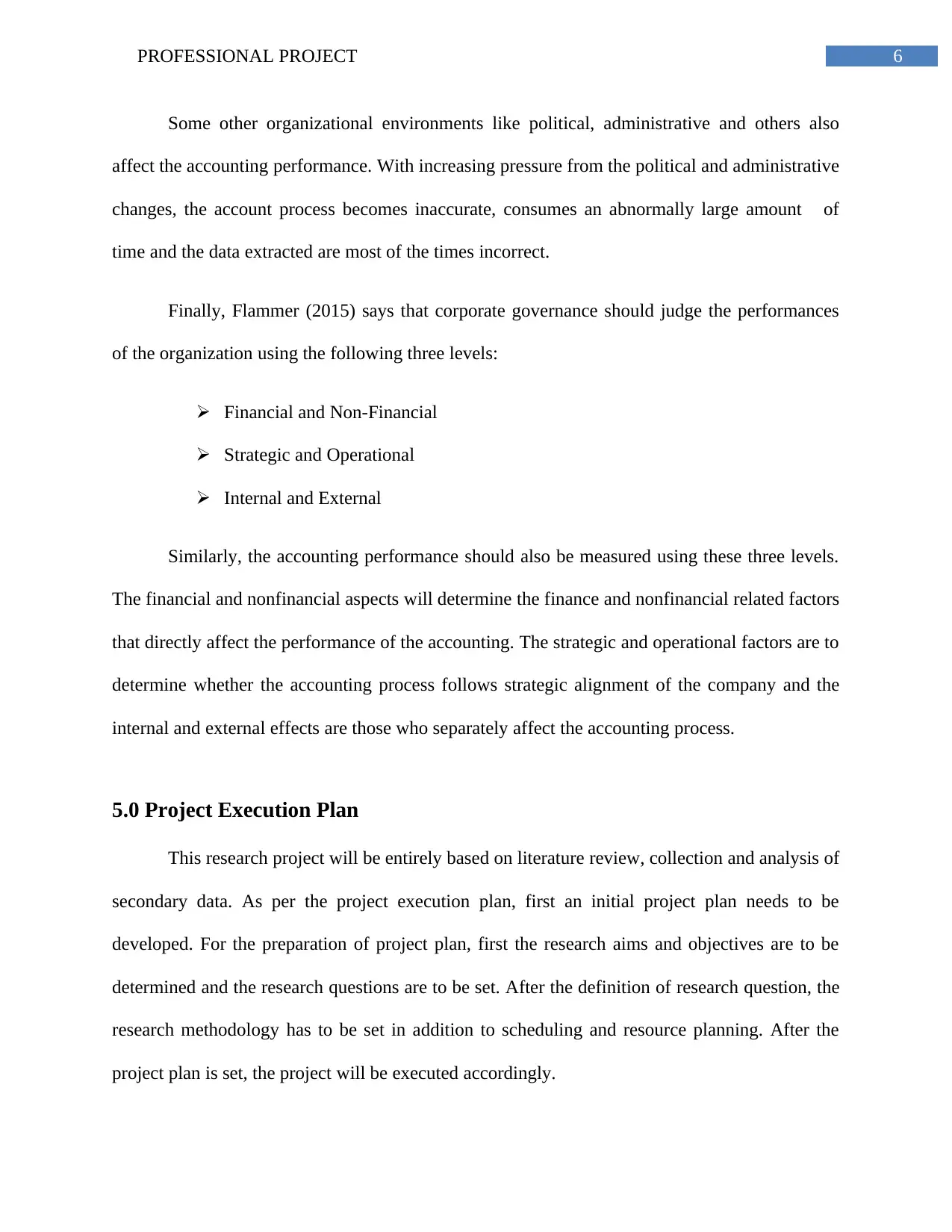
6PROFESSIONAL PROJECT
Some other organizational environments like political, administrative and others also
affect the accounting performance. With increasing pressure from the political and administrative
changes, the account process becomes inaccurate, consumes an abnormally large amount of
time and the data extracted are most of the times incorrect.
Finally, Flammer (2015) says that corporate governance should judge the performances
of the organization using the following three levels:
Financial and Non-Financial
Strategic and Operational
Internal and External
Similarly, the accounting performance should also be measured using these three levels.
The financial and nonfinancial aspects will determine the finance and nonfinancial related factors
that directly affect the performance of the accounting. The strategic and operational factors are to
determine whether the accounting process follows strategic alignment of the company and the
internal and external effects are those who separately affect the accounting process.
5.0 Project Execution Plan
This research project will be entirely based on literature review, collection and analysis of
secondary data. As per the project execution plan, first an initial project plan needs to be
developed. For the preparation of project plan, first the research aims and objectives are to be
determined and the research questions are to be set. After the definition of research question, the
research methodology has to be set in addition to scheduling and resource planning. After the
project plan is set, the project will be executed accordingly.
Some other organizational environments like political, administrative and others also
affect the accounting performance. With increasing pressure from the political and administrative
changes, the account process becomes inaccurate, consumes an abnormally large amount of
time and the data extracted are most of the times incorrect.
Finally, Flammer (2015) says that corporate governance should judge the performances
of the organization using the following three levels:
Financial and Non-Financial
Strategic and Operational
Internal and External
Similarly, the accounting performance should also be measured using these three levels.
The financial and nonfinancial aspects will determine the finance and nonfinancial related factors
that directly affect the performance of the accounting. The strategic and operational factors are to
determine whether the accounting process follows strategic alignment of the company and the
internal and external effects are those who separately affect the accounting process.
5.0 Project Execution Plan
This research project will be entirely based on literature review, collection and analysis of
secondary data. As per the project execution plan, first an initial project plan needs to be
developed. For the preparation of project plan, first the research aims and objectives are to be
determined and the research questions are to be set. After the definition of research question, the
research methodology has to be set in addition to scheduling and resource planning. After the
project plan is set, the project will be executed accordingly.
Paraphrase This Document
Need a fresh take? Get an instant paraphrase of this document with our AI Paraphraser
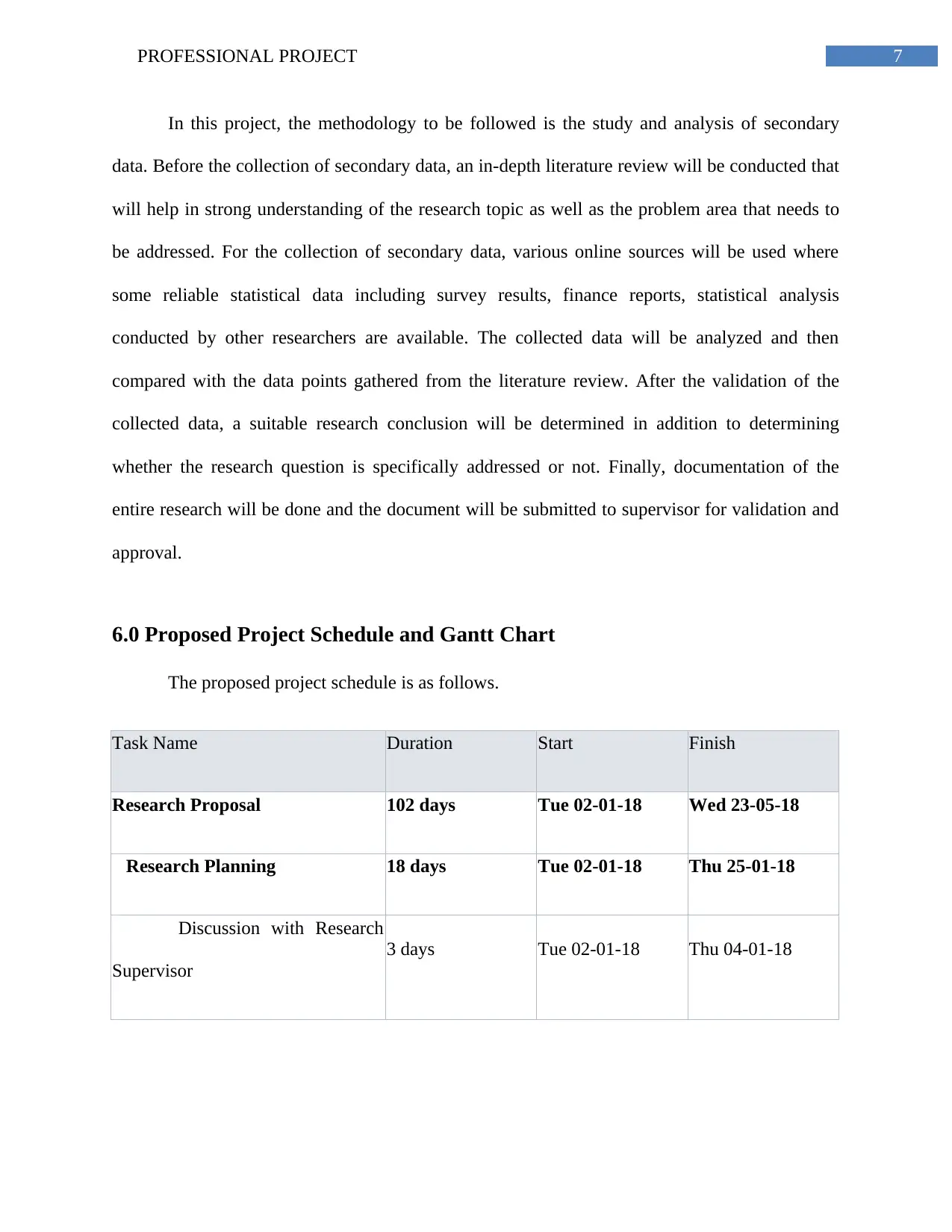
7PROFESSIONAL PROJECT
In this project, the methodology to be followed is the study and analysis of secondary
data. Before the collection of secondary data, an in-depth literature review will be conducted that
will help in strong understanding of the research topic as well as the problem area that needs to
be addressed. For the collection of secondary data, various online sources will be used where
some reliable statistical data including survey results, finance reports, statistical analysis
conducted by other researchers are available. The collected data will be analyzed and then
compared with the data points gathered from the literature review. After the validation of the
collected data, a suitable research conclusion will be determined in addition to determining
whether the research question is specifically addressed or not. Finally, documentation of the
entire research will be done and the document will be submitted to supervisor for validation and
approval.
6.0 Proposed Project Schedule and Gantt Chart
The proposed project schedule is as follows.
Task Name Duration Start Finish
Research Proposal 102 days Tue 02-01-18 Wed 23-05-18
Research Planning 18 days Tue 02-01-18 Thu 25-01-18
Discussion with Research
Supervisor
3 days Tue 02-01-18 Thu 04-01-18
In this project, the methodology to be followed is the study and analysis of secondary
data. Before the collection of secondary data, an in-depth literature review will be conducted that
will help in strong understanding of the research topic as well as the problem area that needs to
be addressed. For the collection of secondary data, various online sources will be used where
some reliable statistical data including survey results, finance reports, statistical analysis
conducted by other researchers are available. The collected data will be analyzed and then
compared with the data points gathered from the literature review. After the validation of the
collected data, a suitable research conclusion will be determined in addition to determining
whether the research question is specifically addressed or not. Finally, documentation of the
entire research will be done and the document will be submitted to supervisor for validation and
approval.
6.0 Proposed Project Schedule and Gantt Chart
The proposed project schedule is as follows.
Task Name Duration Start Finish
Research Proposal 102 days Tue 02-01-18 Wed 23-05-18
Research Planning 18 days Tue 02-01-18 Thu 25-01-18
Discussion with Research
Supervisor
3 days Tue 02-01-18 Thu 04-01-18
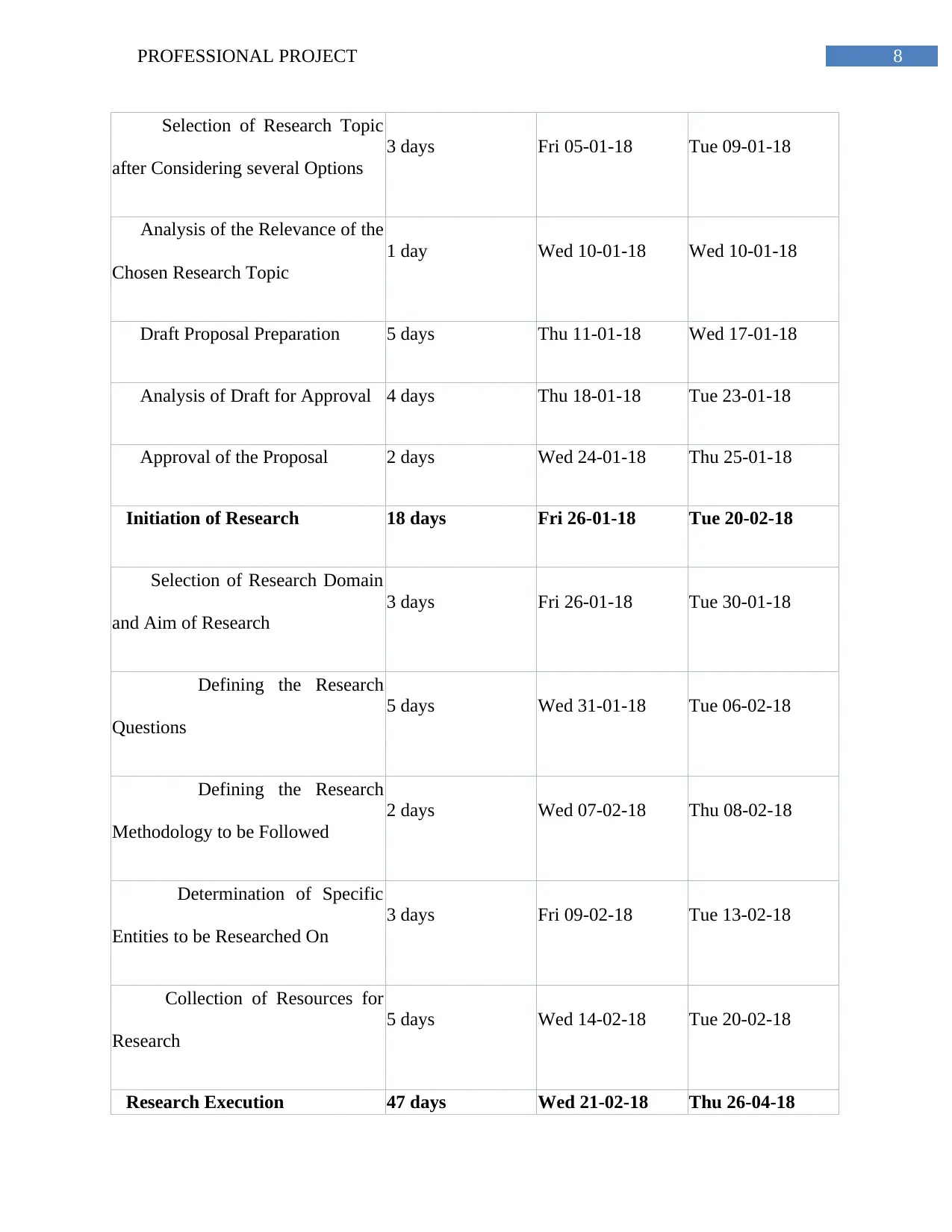
8PROFESSIONAL PROJECT
Selection of Research Topic
after Considering several Options
3 days Fri 05-01-18 Tue 09-01-18
Analysis of the Relevance of the
Chosen Research Topic
1 day Wed 10-01-18 Wed 10-01-18
Draft Proposal Preparation 5 days Thu 11-01-18 Wed 17-01-18
Analysis of Draft for Approval 4 days Thu 18-01-18 Tue 23-01-18
Approval of the Proposal 2 days Wed 24-01-18 Thu 25-01-18
Initiation of Research 18 days Fri 26-01-18 Tue 20-02-18
Selection of Research Domain
and Aim of Research
3 days Fri 26-01-18 Tue 30-01-18
Defining the Research
Questions
5 days Wed 31-01-18 Tue 06-02-18
Defining the Research
Methodology to be Followed
2 days Wed 07-02-18 Thu 08-02-18
Determination of Specific
Entities to be Researched On
3 days Fri 09-02-18 Tue 13-02-18
Collection of Resources for
Research
5 days Wed 14-02-18 Tue 20-02-18
Research Execution 47 days Wed 21-02-18 Thu 26-04-18
Selection of Research Topic
after Considering several Options
3 days Fri 05-01-18 Tue 09-01-18
Analysis of the Relevance of the
Chosen Research Topic
1 day Wed 10-01-18 Wed 10-01-18
Draft Proposal Preparation 5 days Thu 11-01-18 Wed 17-01-18
Analysis of Draft for Approval 4 days Thu 18-01-18 Tue 23-01-18
Approval of the Proposal 2 days Wed 24-01-18 Thu 25-01-18
Initiation of Research 18 days Fri 26-01-18 Tue 20-02-18
Selection of Research Domain
and Aim of Research
3 days Fri 26-01-18 Tue 30-01-18
Defining the Research
Questions
5 days Wed 31-01-18 Tue 06-02-18
Defining the Research
Methodology to be Followed
2 days Wed 07-02-18 Thu 08-02-18
Determination of Specific
Entities to be Researched On
3 days Fri 09-02-18 Tue 13-02-18
Collection of Resources for
Research
5 days Wed 14-02-18 Tue 20-02-18
Research Execution 47 days Wed 21-02-18 Thu 26-04-18
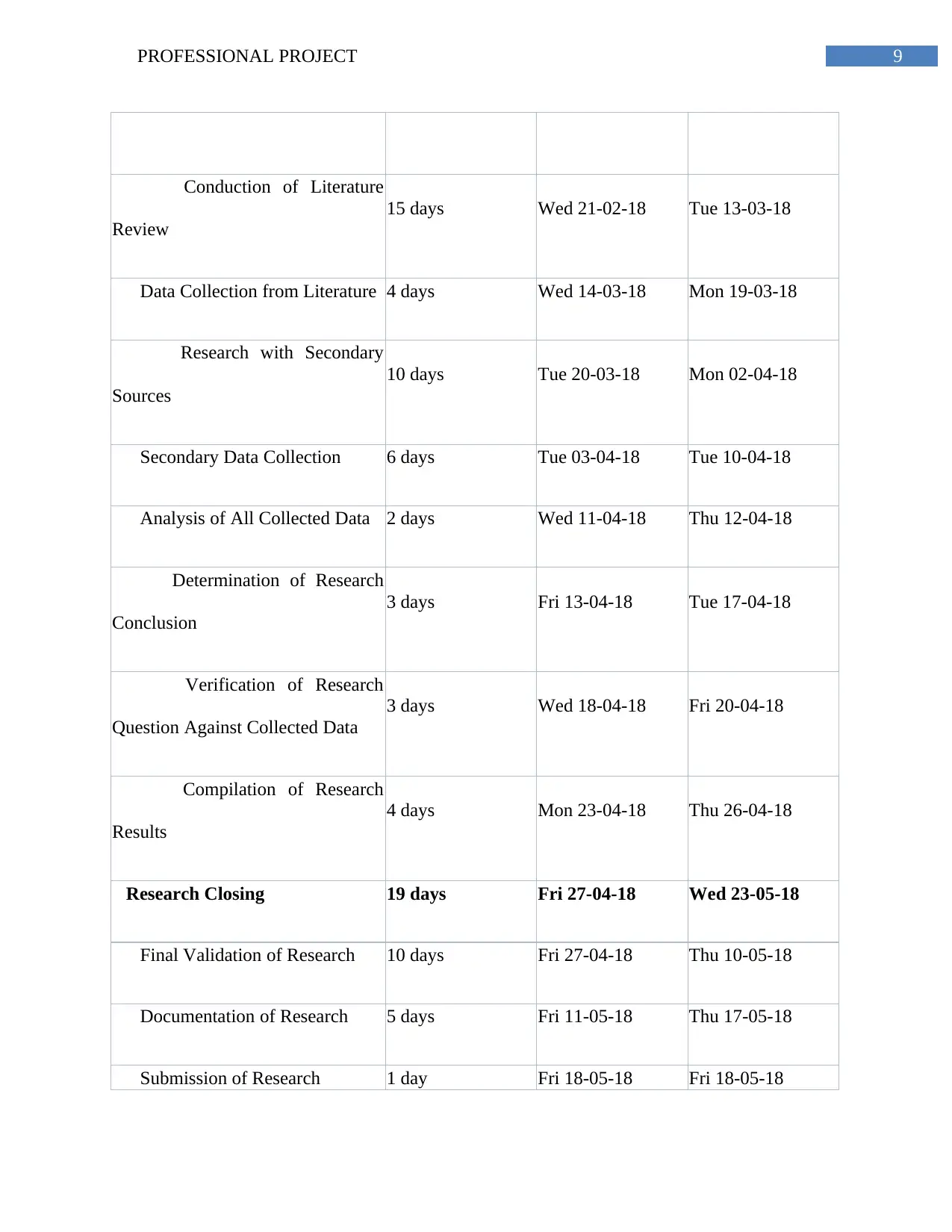
9PROFESSIONAL PROJECT
Conduction of Literature
Review
15 days Wed 21-02-18 Tue 13-03-18
Data Collection from Literature 4 days Wed 14-03-18 Mon 19-03-18
Research with Secondary
Sources
10 days Tue 20-03-18 Mon 02-04-18
Secondary Data Collection 6 days Tue 03-04-18 Tue 10-04-18
Analysis of All Collected Data 2 days Wed 11-04-18 Thu 12-04-18
Determination of Research
Conclusion
3 days Fri 13-04-18 Tue 17-04-18
Verification of Research
Question Against Collected Data
3 days Wed 18-04-18 Fri 20-04-18
Compilation of Research
Results
4 days Mon 23-04-18 Thu 26-04-18
Research Closing 19 days Fri 27-04-18 Wed 23-05-18
Final Validation of Research 10 days Fri 27-04-18 Thu 10-05-18
Documentation of Research 5 days Fri 11-05-18 Thu 17-05-18
Submission of Research 1 day Fri 18-05-18 Fri 18-05-18
Conduction of Literature
Review
15 days Wed 21-02-18 Tue 13-03-18
Data Collection from Literature 4 days Wed 14-03-18 Mon 19-03-18
Research with Secondary
Sources
10 days Tue 20-03-18 Mon 02-04-18
Secondary Data Collection 6 days Tue 03-04-18 Tue 10-04-18
Analysis of All Collected Data 2 days Wed 11-04-18 Thu 12-04-18
Determination of Research
Conclusion
3 days Fri 13-04-18 Tue 17-04-18
Verification of Research
Question Against Collected Data
3 days Wed 18-04-18 Fri 20-04-18
Compilation of Research
Results
4 days Mon 23-04-18 Thu 26-04-18
Research Closing 19 days Fri 27-04-18 Wed 23-05-18
Final Validation of Research 10 days Fri 27-04-18 Thu 10-05-18
Documentation of Research 5 days Fri 11-05-18 Thu 17-05-18
Submission of Research 1 day Fri 18-05-18 Fri 18-05-18
Secure Best Marks with AI Grader
Need help grading? Try our AI Grader for instant feedback on your assignments.
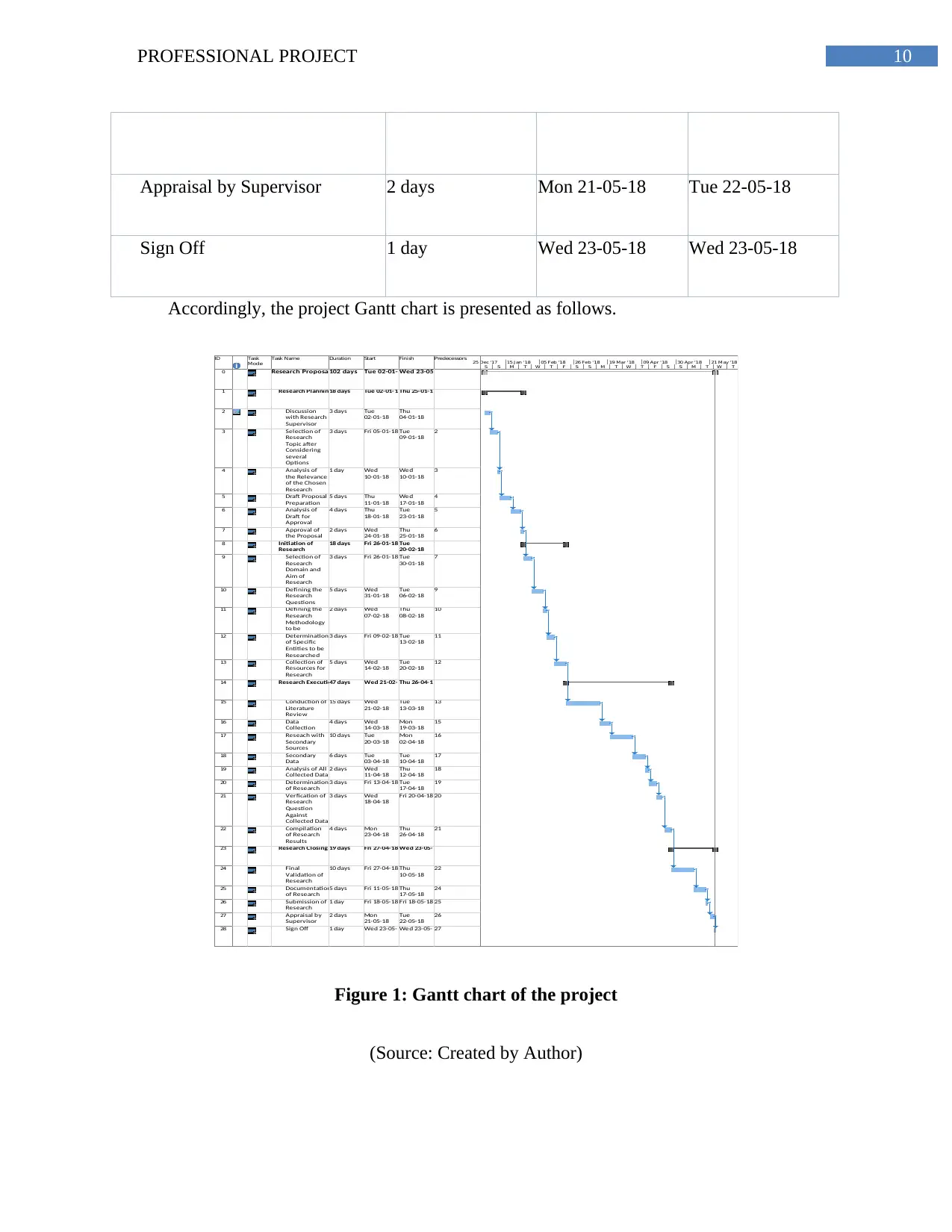
10PROFESSIONAL PROJECT
Appraisal by Supervisor 2 days Mon 21-05-18 Tue 22-05-18
Sign Off 1 day Wed 23-05-18 Wed 23-05-18
Accordingly, the project Gantt chart is presented as follows.
ID Task
Mode
Task Name Duration Start Finish Predecessors
0 Research Proposal102 days Tue 02-01-18Wed 23-05-18
1 Research Planning18 days Tue 02-01-18Thu 25-01-18
2 Discussion
with Research
Supervisor
3 days Tue
02-01-18
Thu
04-01-18
3 Selection of
Research
Topic after
Considering
several
Options
3 days Fri 05-01-18 Tue
09-01-18
2
4 Analysis of
the Relevance
of the Chosen
Research
Topic
1 day Wed
10-01-18
Wed
10-01-18
3
5 Draft Proposal
Preparation
5 days Thu
11-01-18
Wed
17-01-18
4
6 Analysis of
Draft for
Approval
4 days Thu
18-01-18
Tue
23-01-18
5
7 Approval of
the Proposal
2 days Wed
24-01-18
Thu
25-01-18
6
8 Initiation of
Research
18 days Fri 26-01-18 Tue
20-02-18
9 Selection of
Research
Domain and
Aim of
Research
3 days Fri 26-01-18 Tue
30-01-18
7
10 Defining the
Research
Questions
5 days Wed
31-01-18
Tue
06-02-18
9
11 Defining the
Research
Methodology
to be
Followed
2 days Wed
07-02-18
Thu
08-02-18
10
12 Determination
of Specific
Entities to be
Researched
On
3 days Fri 09-02-18 Tue
13-02-18
11
13 Collection of
Resources for
Research
5 days Wed
14-02-18
Tue
20-02-18
12
14 Research Execution47 days Wed 21-02-18Thu 26-04-18
15 Conduction of
Literature
Review
15 days Wed
21-02-18
Tue
13-03-18
13
16 Data
Collection
from
4 days Wed
14-03-18
Mon
19-03-18
15
17 Reseach with
Secondary
Sources
10 days Tue
20-03-18
Mon
02-04-18
16
18 Secondary
Data
Collection
6 days Tue
03-04-18
Tue
10-04-18
17
19 Analysis of All
Collected Data
2 days Wed
11-04-18
Thu
12-04-18
18
20 Determination
of Research
Conclusion
3 days Fri 13-04-18 Tue
17-04-18
19
21 Verfication of
Research
Question
Against
Collected Data
3 days Wed
18-04-18
Fri 20-04-18 20
22 Compilation
of Research
Results
4 days Mon
23-04-18
Thu
26-04-18
21
23 Research Closing 19 days Fri 27-04-18 Wed 23-05-18
24 Final
Validation of
Research
10 days Fri 27-04-18 Thu
10-05-18
22
25 Documentation
of Research
5 days Fri 11-05-18 Thu
17-05-18
24
26 Submission of
Research
1 day Fri 18-05-18 Fri 18-05-18 25
27 Appraisal by
Supervisor
2 days Mon
21-05-18
Tue
22-05-18
26
28 Sign Off 1 day Wed 23-05-18Wed 23-05-1827
S S M T W T F S S M T W T F S S M T W T
25 Dec '17 15 J an '18 05 Feb '18 26 Feb '18 19 Mar '18 09 Apr '18 30 Apr '18 21 May '18
Figure 1: Gantt chart of the project
(Source: Created by Author)
Appraisal by Supervisor 2 days Mon 21-05-18 Tue 22-05-18
Sign Off 1 day Wed 23-05-18 Wed 23-05-18
Accordingly, the project Gantt chart is presented as follows.
ID Task
Mode
Task Name Duration Start Finish Predecessors
0 Research Proposal102 days Tue 02-01-18Wed 23-05-18
1 Research Planning18 days Tue 02-01-18Thu 25-01-18
2 Discussion
with Research
Supervisor
3 days Tue
02-01-18
Thu
04-01-18
3 Selection of
Research
Topic after
Considering
several
Options
3 days Fri 05-01-18 Tue
09-01-18
2
4 Analysis of
the Relevance
of the Chosen
Research
Topic
1 day Wed
10-01-18
Wed
10-01-18
3
5 Draft Proposal
Preparation
5 days Thu
11-01-18
Wed
17-01-18
4
6 Analysis of
Draft for
Approval
4 days Thu
18-01-18
Tue
23-01-18
5
7 Approval of
the Proposal
2 days Wed
24-01-18
Thu
25-01-18
6
8 Initiation of
Research
18 days Fri 26-01-18 Tue
20-02-18
9 Selection of
Research
Domain and
Aim of
Research
3 days Fri 26-01-18 Tue
30-01-18
7
10 Defining the
Research
Questions
5 days Wed
31-01-18
Tue
06-02-18
9
11 Defining the
Research
Methodology
to be
Followed
2 days Wed
07-02-18
Thu
08-02-18
10
12 Determination
of Specific
Entities to be
Researched
On
3 days Fri 09-02-18 Tue
13-02-18
11
13 Collection of
Resources for
Research
5 days Wed
14-02-18
Tue
20-02-18
12
14 Research Execution47 days Wed 21-02-18Thu 26-04-18
15 Conduction of
Literature
Review
15 days Wed
21-02-18
Tue
13-03-18
13
16 Data
Collection
from
4 days Wed
14-03-18
Mon
19-03-18
15
17 Reseach with
Secondary
Sources
10 days Tue
20-03-18
Mon
02-04-18
16
18 Secondary
Data
Collection
6 days Tue
03-04-18
Tue
10-04-18
17
19 Analysis of All
Collected Data
2 days Wed
11-04-18
Thu
12-04-18
18
20 Determination
of Research
Conclusion
3 days Fri 13-04-18 Tue
17-04-18
19
21 Verfication of
Research
Question
Against
Collected Data
3 days Wed
18-04-18
Fri 20-04-18 20
22 Compilation
of Research
Results
4 days Mon
23-04-18
Thu
26-04-18
21
23 Research Closing 19 days Fri 27-04-18 Wed 23-05-18
24 Final
Validation of
Research
10 days Fri 27-04-18 Thu
10-05-18
22
25 Documentation
of Research
5 days Fri 11-05-18 Thu
17-05-18
24
26 Submission of
Research
1 day Fri 18-05-18 Fri 18-05-18 25
27 Appraisal by
Supervisor
2 days Mon
21-05-18
Tue
22-05-18
26
28 Sign Off 1 day Wed 23-05-18Wed 23-05-1827
S S M T W T F S S M T W T F S S M T W T
25 Dec '17 15 J an '18 05 Feb '18 26 Feb '18 19 Mar '18 09 Apr '18 30 Apr '18 21 May '18
Figure 1: Gantt chart of the project
(Source: Created by Author)
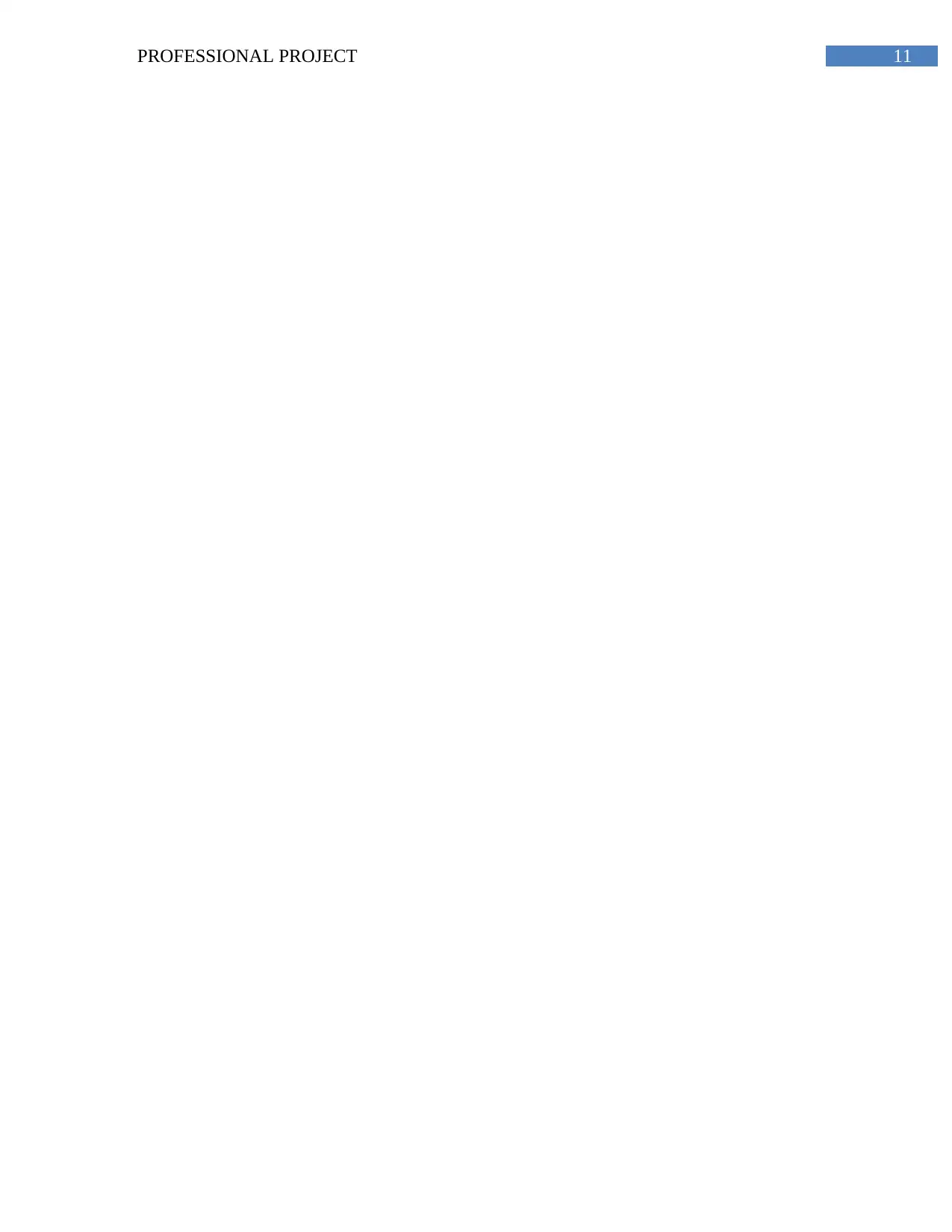
11PROFESSIONAL PROJECT
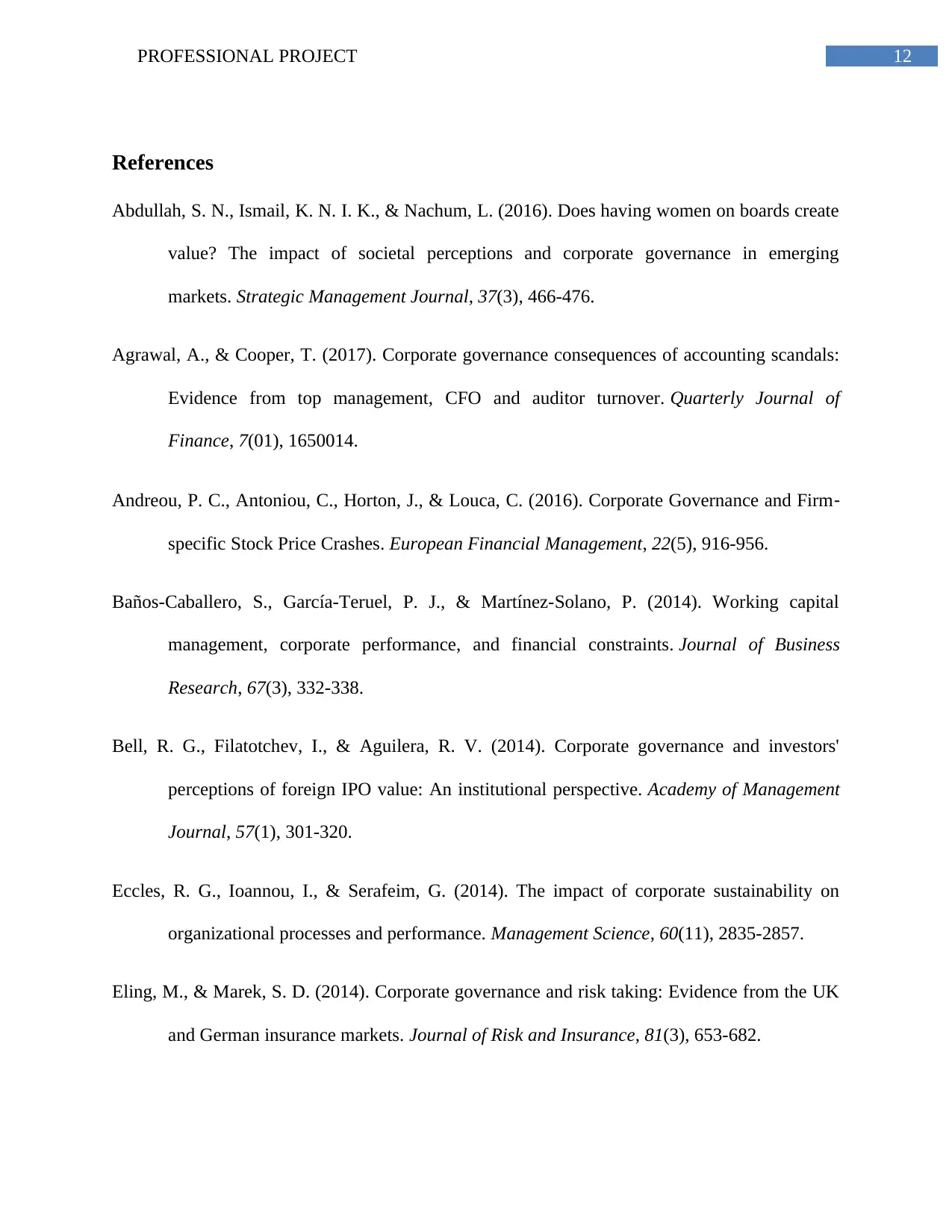
12PROFESSIONAL PROJECT
References
Abdullah, S. N., Ismail, K. N. I. K., & Nachum, L. (2016). Does having women on boards create
value? The impact of societal perceptions and corporate governance in emerging
markets. Strategic Management Journal, 37(3), 466-476.
Agrawal, A., & Cooper, T. (2017). Corporate governance consequences of accounting scandals:
Evidence from top management, CFO and auditor turnover. Quarterly Journal of
Finance, 7(01), 1650014.
Andreou, P. C., Antoniou, C., Horton, J., & Louca, C. (2016). Corporate Governance and Firm‐
specific Stock Price Crashes. European Financial Management, 22(5), 916-956.
Baños-Caballero, S., García-Teruel, P. J., & Martínez-Solano, P. (2014). Working capital
management, corporate performance, and financial constraints. Journal of Business
Research, 67(3), 332-338.
Bell, R. G., Filatotchev, I., & Aguilera, R. V. (2014). Corporate governance and investors'
perceptions of foreign IPO value: An institutional perspective. Academy of Management
Journal, 57(1), 301-320.
Eccles, R. G., Ioannou, I., & Serafeim, G. (2014). The impact of corporate sustainability on
organizational processes and performance. Management Science, 60(11), 2835-2857.
Eling, M., & Marek, S. D. (2014). Corporate governance and risk taking: Evidence from the UK
and German insurance markets. Journal of Risk and Insurance, 81(3), 653-682.
References
Abdullah, S. N., Ismail, K. N. I. K., & Nachum, L. (2016). Does having women on boards create
value? The impact of societal perceptions and corporate governance in emerging
markets. Strategic Management Journal, 37(3), 466-476.
Agrawal, A., & Cooper, T. (2017). Corporate governance consequences of accounting scandals:
Evidence from top management, CFO and auditor turnover. Quarterly Journal of
Finance, 7(01), 1650014.
Andreou, P. C., Antoniou, C., Horton, J., & Louca, C. (2016). Corporate Governance and Firm‐
specific Stock Price Crashes. European Financial Management, 22(5), 916-956.
Baños-Caballero, S., García-Teruel, P. J., & Martínez-Solano, P. (2014). Working capital
management, corporate performance, and financial constraints. Journal of Business
Research, 67(3), 332-338.
Bell, R. G., Filatotchev, I., & Aguilera, R. V. (2014). Corporate governance and investors'
perceptions of foreign IPO value: An institutional perspective. Academy of Management
Journal, 57(1), 301-320.
Eccles, R. G., Ioannou, I., & Serafeim, G. (2014). The impact of corporate sustainability on
organizational processes and performance. Management Science, 60(11), 2835-2857.
Eling, M., & Marek, S. D. (2014). Corporate governance and risk taking: Evidence from the UK
and German insurance markets. Journal of Risk and Insurance, 81(3), 653-682.
Paraphrase This Document
Need a fresh take? Get an instant paraphrase of this document with our AI Paraphraser
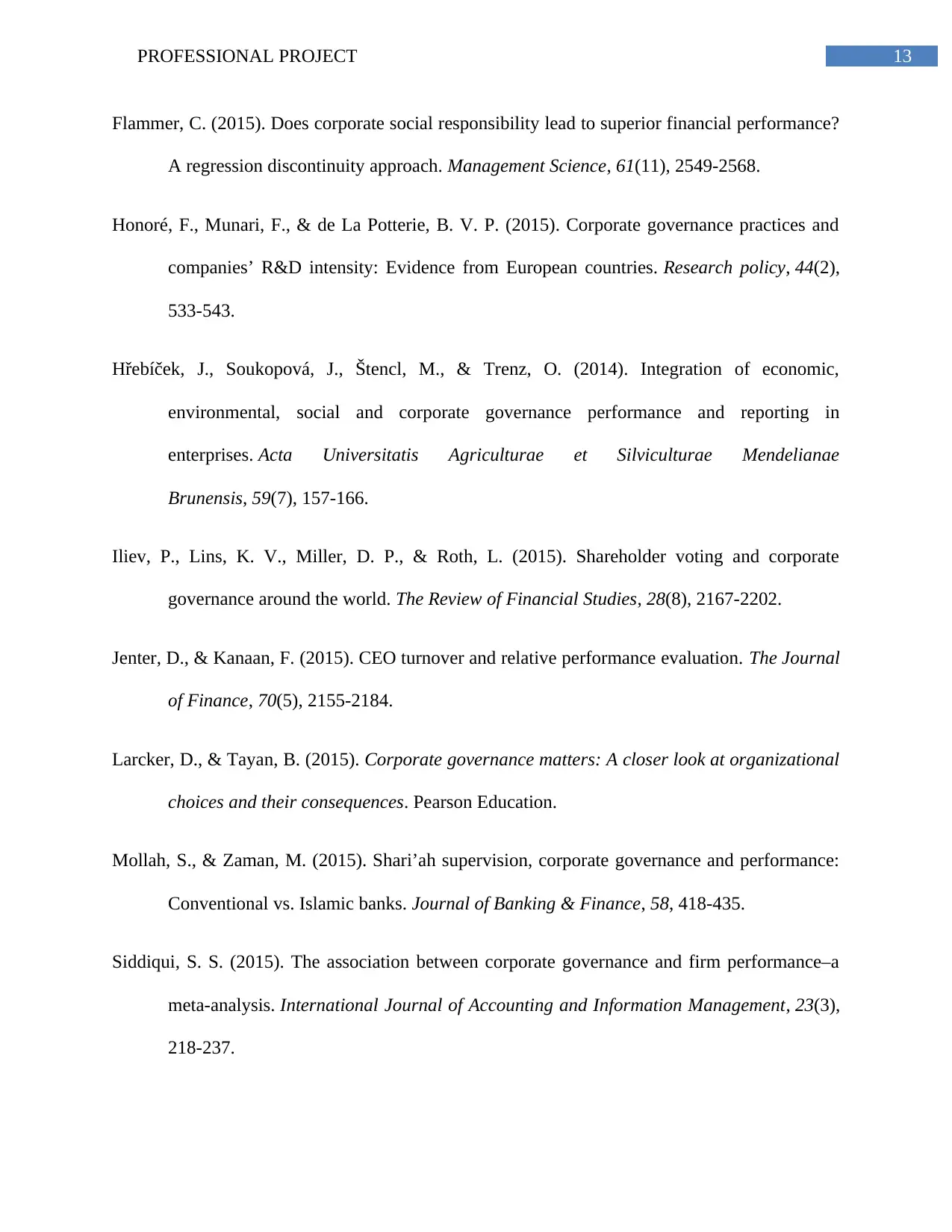
13PROFESSIONAL PROJECT
Flammer, C. (2015). Does corporate social responsibility lead to superior financial performance?
A regression discontinuity approach. Management Science, 61(11), 2549-2568.
Honoré, F., Munari, F., & de La Potterie, B. V. P. (2015). Corporate governance practices and
companies’ R&D intensity: Evidence from European countries. Research policy, 44(2),
533-543.
Hřebíček, J., Soukopová, J., Štencl, M., & Trenz, O. (2014). Integration of economic,
environmental, social and corporate governance performance and reporting in
enterprises. Acta Universitatis Agriculturae et Silviculturae Mendelianae
Brunensis, 59(7), 157-166.
Iliev, P., Lins, K. V., Miller, D. P., & Roth, L. (2015). Shareholder voting and corporate
governance around the world. The Review of Financial Studies, 28(8), 2167-2202.
Jenter, D., & Kanaan, F. (2015). CEO turnover and relative performance evaluation. The Journal
of Finance, 70(5), 2155-2184.
Larcker, D., & Tayan, B. (2015). Corporate governance matters: A closer look at organizational
choices and their consequences. Pearson Education.
Mollah, S., & Zaman, M. (2015). Shari’ah supervision, corporate governance and performance:
Conventional vs. Islamic banks. Journal of Banking & Finance, 58, 418-435.
Siddiqui, S. S. (2015). The association between corporate governance and firm performance–a
meta-analysis. International Journal of Accounting and Information Management, 23(3),
218-237.
Flammer, C. (2015). Does corporate social responsibility lead to superior financial performance?
A regression discontinuity approach. Management Science, 61(11), 2549-2568.
Honoré, F., Munari, F., & de La Potterie, B. V. P. (2015). Corporate governance practices and
companies’ R&D intensity: Evidence from European countries. Research policy, 44(2),
533-543.
Hřebíček, J., Soukopová, J., Štencl, M., & Trenz, O. (2014). Integration of economic,
environmental, social and corporate governance performance and reporting in
enterprises. Acta Universitatis Agriculturae et Silviculturae Mendelianae
Brunensis, 59(7), 157-166.
Iliev, P., Lins, K. V., Miller, D. P., & Roth, L. (2015). Shareholder voting and corporate
governance around the world. The Review of Financial Studies, 28(8), 2167-2202.
Jenter, D., & Kanaan, F. (2015). CEO turnover and relative performance evaluation. The Journal
of Finance, 70(5), 2155-2184.
Larcker, D., & Tayan, B. (2015). Corporate governance matters: A closer look at organizational
choices and their consequences. Pearson Education.
Mollah, S., & Zaman, M. (2015). Shari’ah supervision, corporate governance and performance:
Conventional vs. Islamic banks. Journal of Banking & Finance, 58, 418-435.
Siddiqui, S. S. (2015). The association between corporate governance and firm performance–a
meta-analysis. International Journal of Accounting and Information Management, 23(3),
218-237.
1 out of 14
Related Documents
Your All-in-One AI-Powered Toolkit for Academic Success.
+13062052269
info@desklib.com
Available 24*7 on WhatsApp / Email
![[object Object]](/_next/static/media/star-bottom.7253800d.svg)
Unlock your academic potential
© 2024 | Zucol Services PVT LTD | All rights reserved.





